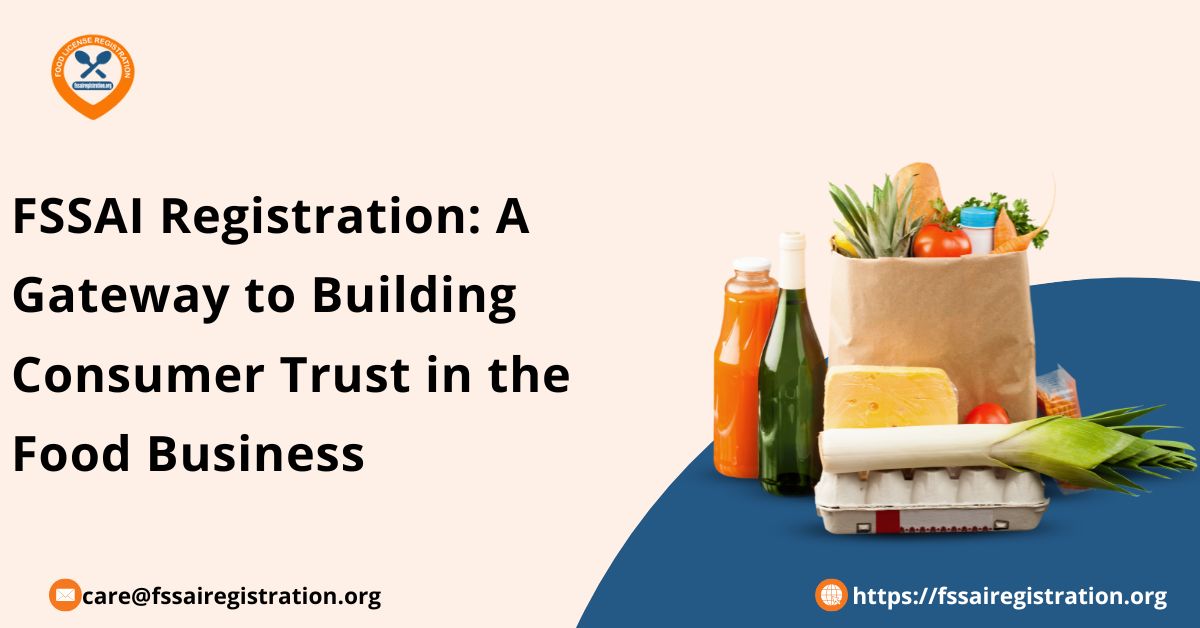Introduction
In the food industry, trust is everything. Whether you run a roadside food stall or a five-star restaurant, your customers must feel confident about the quality and safety of what you serve. This is where FSSAI Registration becomes more than just a legal requirement—it becomes a symbol of trust, hygiene, and quality.
In this article, we explore a unique angle on how FSSAI registration helps food businesses build and maintain consumer trust, and why it is essential for brand growth in today’s health-conscious world.
What is FSSAI Registration?
FSSAI stands for Food Safety and Standards Authority of India, a government body under the Ministry of Health & Family Welfare. It is responsible for setting food safety standards, regulating food products, and ensuring that food sold in India is safe, hygienic, and nutritious.
Every food business operator (FBO) in India is required to register or obtain a license from FSSAI, depending on their size and nature of operations.
FSSAI Registration vs. FSSAI License:
- FSSAI Registration is for small businesses (turnover ≤ ₹12 lakh/year).
- FSSAI License (State or Central) is for larger businesses.
Why FSSAI Registration Matters Beyond Compliance
Let’s go beyond legality. FSSAI registration is crucial for:
Building Customer Confidence
Consumers trust food products that carry an FSSAI number. It tells them the business follows hygiene standards and is certified by a national authority.
Establishing Brand Credibility
Even a small food brand can build a loyal customer base by showcasing FSSAI compliance.
Unlocking Growth Opportunities
Online platforms like Swiggy, Zomato, Amazon, Flipkart, and BigBasket require FSSAI registration to list food items.
Ensuring Food Safety
FSSAI registration helps businesses implement safe food practices, reducing the risk of contamination and illness.
Types of FSSAI Licenses
There are three types of FSSAI licenses based on business size:
Basic Registration
- For small businesses with a turnover of less than ₹12 lakh per year
- Suitable for home-based kitchens, street vendors, and small retailers
State License
- For medium businesses with turnover between ₹12 lakh and ₹20 crore
- Applicable to restaurants, dairies, and distributors operating within a state
Central License
- For large-scale businesses with a turnover of over ₹20 crore
- Required for import/export, large food brands, and multi-state operations
Online Process for FSSAI Registration
The Government of India has made FSSAI registration completely online via the FoSCoS portal (Food Safety Compliance System). Here's how:
Visit the FSSAI Website: Go to the official FSSAI registration portal online.
Fill in Basic Details: Enter your personal and business details—like your name, phone number, email, business name, type of food you deal with, business type, and full address.
Upload Your PAN Card: Add a scanned copy or photo of your PAN card as part of the application.
Double-Check and Submit: Review all your information to ensure it’s correct, then click the "Submit" button.
Pay the Registration Fee: Pay the applicable fees online using UPI, debit/credit card, or net banking. The fee depends on your license category.
OTP Verification Call: Our team will call you to verify your mobile number or email using a one-time password (OTP).
Inspection (If Needed): In some cases, FSSAI officers may visit your premises for a quick inspection.
Get Your License: Once everything is approved, your FSSAI license will be available for download from the official website.
Documents Required
Here’s a simplified list of documents you may need:
- Passport-sized photo of the applicant
- Government-issued ID proof (Aadhar/PAN)
- Business premises address proof
- Details of food items you intend to sell
- Declaration of food safety management system
For State and Central licenses, additional documents like layout plans, equipment list, water testing report, and NOC from the local authority may be required.
How FSSAI Registration Enhances Consumer Trust
Let’s understand this from a consumer’s perspective.
Transparency
When a consumer sees the FSSAI number on packaging or a restaurant menu, they feel reassured about the authenticity and source of the food.
Informed Choices
People today read labels. FSSAI compliance gives customers confidence that they are consuming something that’s tested and safe.
Family Safety
Parents and families prefer buying food products that are FSSAI certified because it assures them that the food has passed quality checks.
Penalty for Not Having FSSAI Registration
Running a food business without a valid license can lead to:
- Fine up to ₹5 lakh
- Imprisonment up to 6 months
- Closure of your business
In short, no license = no business in the eyes of the law.
Future of Food Licensing in India
FSSAI is constantly improving the system to make it easier and more transparent. Some plans include:
- Mobile apps for quick license application
- AI to detect food safety violations
- Integration with GST, MSME, and Aadhar systems
- Digital inspections and real-time alerts
This will further enhance food safety and consumer trust across the country.
Suggested read:- FSSAI Food safety license registration for fish exporters in India
Conclusion
In a world where consumers are more aware and health-conscious than ever, FSSAI registration isn’t just a rule—it’s a competitive advantage. It tells your customers that your food is safe, your business is accountable, and your brand is reliable.
Whether you're starting a home bakery, selling pickles online, or opening a new restaurant, your first step to success should be a simple but powerful registration with FSSAI.
Earn trust. Build your brand. Grow your business—legally and confidently.





Comments